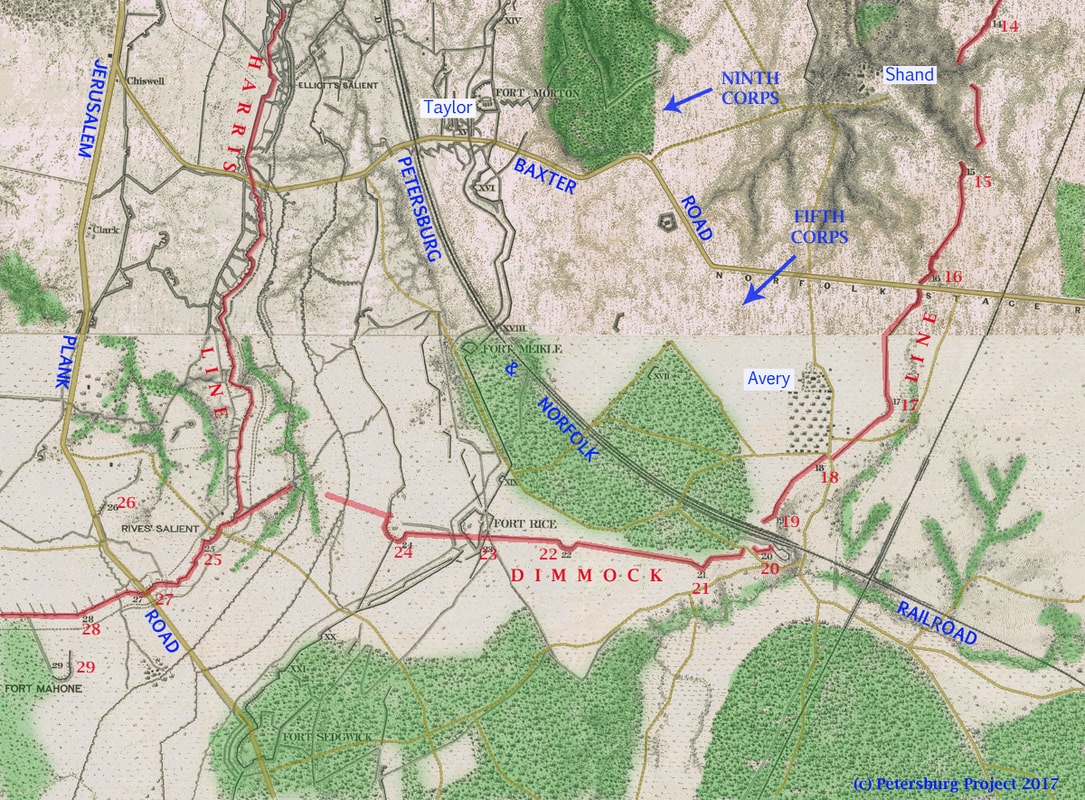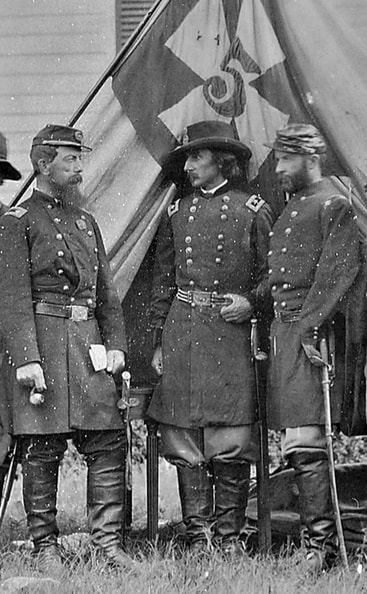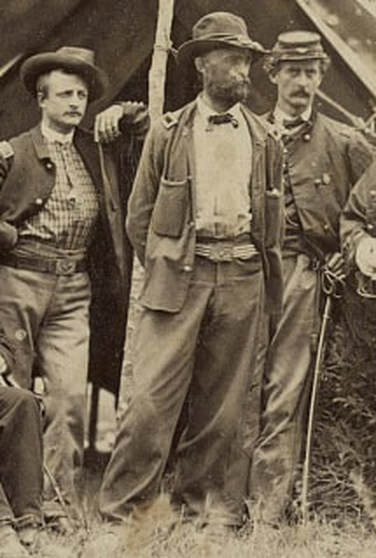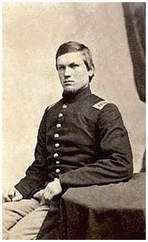Chamberlain Before Petersburg, June 18, 1864 -- Lyman Watches It Unfold
from Meade's Army: the Private Notebooks of Lt. Col. Theodore Lyman (Kent State University Press, 2007)
 Lt. Col. Theodore Lyman, Meade's A.D.C.
Lt. Col. Theodore Lyman, Meade's A.D.C.
"June 18, Saturday —We were to have an assault all along the line; but there was a mysterious silence, though the skirmishers were ordered forward. 5.30 A.M. Some shots, but not a great many. They report only a skirmish line in our front. Several little squads of prisoners brought in, who say they were caught asleep and that their line fell back 1/2 hour before day. One fellow said it was only a very little way to the town and he heard they were going to evacuate it. But another, a fine, sharp fellow, remarked with a quiet smile, “I suppose you think you are going to have a great success; but I think you will be disappointed!” He had been taken while out with a party to bury some men. —Our people are now in the rebel works of last night. Still they seem to hold back or not to go on briskly and together. 6.50 A.M. Gen. Meade has ordered the whole line to advance. On the left and in front of the Avery house, Cutler’s skirmishers are across the Norfolk rail. 7.15. Roebling rode in, and reported he had observed and reconnoitred the new position of the enemy, which was along the ridge beyond the railroad, and that they had works and batteries in position; in some of which he had counted the cannon. Previous to this the Second Corps people had picked up a rebel order to fall back, and take and fortify a new position, which had been selected."
|
"7.45. Gen. Warren mounted and rode farther forward. He passed the Shind house (where ran the captured pits, just on the bank of a deep waterway) and crossed a large oat field, on the other side of which was the rebel second line of pits which was taken and retaken last night. A great number of rebel dead lay there; two men had lost the tops of their heads, carried away by the same round-shot. Gen. Warren established himself to the right, and in front of, the Avery house, just where a heavy pine wood made a corner into the open land. In our rear was the oat field; on the left, open, untilled land; and in front we could see the ridge whereon the enemy was still busy in digging. Two roads here crossed, where was a large, hollow oak, under which stood the General. As we got there the skirmishing had become quite lively on our right and our left, both of which were in the woods. Batteries also were firing, especially one of ours near the Avery House, “which” quoth Griffin, “might just as well be in New York!” —In return, the enemy sent artillery projectiles wherever they suspected troops, and they unfortunately had a cross-fire just on our big oak, so that we had all sorts of things about our ears, not to mention bullets from Crawford’s front! It was extremely hot, there, all the day long, intermittently."
|
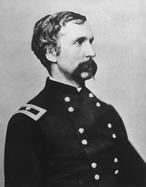 Brig. Gen. Joshua Lawrence Chamberlain, wounded during the assault at Baxter's Road, June 18, 1864.
Brig. Gen. Joshua Lawrence Chamberlain, wounded during the assault at Baxter's Road, June 18, 1864.
"— We rode into the open plain to see the troops go up. The advance was chiefly by the brigades of Chamberlain and [Schweitzer] on the left. It was as I expected—45 days of death, danger, and toil are no preparation for a rush! The men moved up without spirit, received a withering fire, and fell back behind the first crest. Chamberlain desperately wounded. The railroad cut, which offered protection, was full of our wounded. About us came plenty of minié bullets, cutting up the dust, and of shells & case there was no end."
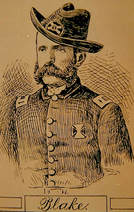 Sketch of Lt. Peleg W. Blake, killed by a sharpshooter, June 18,1864.
Sketch of Lt. Peleg W. Blake, killed by a sharpshooter, June 18,1864.
"Of the wounded brought past us there was an uncommon proportion of terrible artillery lacerations. Lt. Blake, Phillips’ 1st Lieutenant, was brought in on a stretcher, just drawing his last breath, with a bullet straight through the head. I shall never forget one poor artilleryman, his face almost blown to pieces; one of his eyes hanging out and his clothes on fire, apparently from premature explosion of a shell."
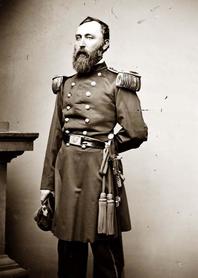 Col. Jacob B. Switzer, commanding brigade, Griffin's division.
Col. Jacob B. Switzer, commanding brigade, Griffin's division.
"6 P.M. Another assault; chiefly on the right by Sweitzer’s brigade, Crawford’s division and parts of the 9th Corps. Warren drew his sword and, with shut lips, walked a few paces forward to look. He turned back, and, with a sad air, said “It’s just the same as before!” Griffin, however, was still confident, and said “I gain a little each time. The next rush I will take those works!” He determined to try once more at 7.30. Rode in at 7.10 to tell Gen. Meade, who already had countermanded the attack: “for” said he “he can but take a point, and he will be driven out again.” During the day, Birney, (who commands the 2d Corps, because Hancock is disabled by his old wound) made a very strong attack, with 7 brigades, but was repulsed, to his bitter disappointment, as they said, for it was a chance for great distinction. (The lines, as determined by the advances of this day, remained afterwards, as those of investment on this side of the town.)"
"At supper, Meade was extremely brave and cheerful, though much disappointed. “I had hoped,” said he “all alone to have entered Petersburg this day.” I felt extremely depressed by what I had been through and seen, so that the General cried out, “Why, Lyman, you are demoralized!” Gen. Humphreys had been down in person to our tree, during the day. One round shot skipped directly over son Harry’s legs, but valiant papa seemed only fearful for his horses, having no such thing as personal fear. By the kindness of Mr. Dana and Col. Dent, Harry was sent home yesterday. The troops, many of whom were much exposed, covered their front during the night."

